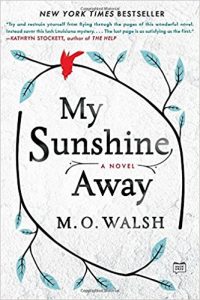MY SUNSHINE AWAY—WHAT HAPPENED WHEN I WASN’T LOOKING
Most novels that include an assault in the plot feature that assault as  the main event. One of the beauties of M.O. Walsh’s debut novel My Sunshine Away is that the rape described on page one is not the main event, no matter how much the young narrator wants to think it is.
the main event. One of the beauties of M.O. Walsh’s debut novel My Sunshine Away is that the rape described on page one is not the main event, no matter how much the young narrator wants to think it is.
At age 14, the narrator, who remains nameless throughout the story, is infatuated with his 15-year-old neighbor Lindy. So, when she is attacked coming home from track practice one summer night in 1989, he thinks the world as he knows it is destroyed. Through his remaining adolescence, he sees life through the prism of the rape and how it affects Lindy’s relationship with him, while all around him so much else is happening that belies the idyllic quality of his southern neighborhood and that will shape him into the adult he becomes.
Walsh skillfully crafts the story so that the narrator is aware of other events but doesn’t always see the significance of them. Of course, it doesn’t help that he becomes one of the suspects in the rape. Once his adoration of Lindy is revealed, he immediately goes on the list, along with three other neighbors, each of whom has demons to battle, some visible and some not.
One of the suspects is Jason Landry, the son of parents who’ve fostered many children but adopted only Jason. None of the other children on the street likes Jason, who was expelled from the local private school, cherishes his private knife collection, and torments a stray dog that hangs around his house, among other distasteful idiosyncrasies. Yet out of curiosity, boredom, or maybe a genuine interest—which, if any, is never made clear—the narrator ends up spending time with him and discovers the dark world of the Landry family, including Jason’s adoptive father, who’s another suspect.
It also doesn’t help that, in an effort to gain attention and be accepted, the narrator tells a group of boys at school about the assault on Lindy. Now he not only thinks the attack weakened his relationship with Lindy, he feels guilty for unintentionally using it to sabotage the relationship himself.
Meanwhile, as all of the narrator’s attention is focused on Lindy, his father leaves the family and his older sister is killed in a car accident. As these events unfold, the narrator experiences them, but doesn’t seem to internalize them. They’re happening to him, but they’re not. Consequently, he’s not as sensitive to their effects on his mother and his other sister, or even himself, as he could be, just as he seems unaffected by the animal abuse and child abuse at the Landrys’.
The one person he does react to is his Uncle Barry, who lives with his family for a month after his sister dies. Barry is a never-ending source of mysterious stories about unusual things that happened to him, and his apparent light-hearted and open approach to life gives the narrator the feeling of an instant bond. Not until after Barry leaves does the narrator’s mother tell him that Barry’s wife is pregnant by another man and he’s hired a private investigator that he can’t afford. For once, a twinkling of light penetrates the narrator’s world. “What my uncle Barry displayed for me that summer was just how strange and complicated adults are,” he says. Then from his viewpoint as an adult looking back on these years, he talks about the “chain gang of ghosts” that follow every adult.
All of My Sunshine Away is told by the adult narrator years after the events happened, but he isn’t judgmental about himself or others. The questions Walsh raises in this novel are deeper than separating right from wrong. They go more to the “why” of the ways we become the people we are. Do youth and innocence explain our earliest encounters with life, and if so, for how long? What about fear and intimidation? What happens if we never shed those? What effect does wearing blinders have?
My Sunshine Away is in many respects a coming-of-age story, but it’s not a story limited by age. Any of us can recognize ourselves in the young narrator. All of us have at one time or another narrowed our world to a pin-hole focus, with a multitude of various consequences.
The events of our lives change us whether we pay attention to them or not.
Sally Whitney
Sally Whitney is the author of When Enemies Offend Thee and Surface and Shadow, available now from Pen-L Publishing, Amazon.com, and Barnesandnoble.com. When Enemies Offend Thee follows a sexual-assault victim who vows to get even on her own when her lack of evidence prevents police from charging the man who attacked her. Surface and Shadow is the story of a woman who risks her marriage and her husband’s career to find out what really happened in a wealthy man’s suspicious death.
Sally’s short stories have appeared in magazines and anthologies, including Best Short Stories from The Saturday Evening Post Great American Fiction Contest 2017, Main Street Rag, Kansas City Voices, Uncertain Promise, Voices from the Porch, New Lines from the Old Line State: An Anthology of Maryland Writers and Grow Old Along With Me—The Best Is Yet to Be, among others. The audio version of Grow Old Along With Me was a Grammy Award finalist in the Spoken Word or Nonmusical Album category. Sally’s stories have also been recognized as a finalist in The Ledge Fiction Competition and semi-finalists in the Syndicated Fiction Project and the Salem College National Literary Awards competition.
- Web |
- More Posts(67)